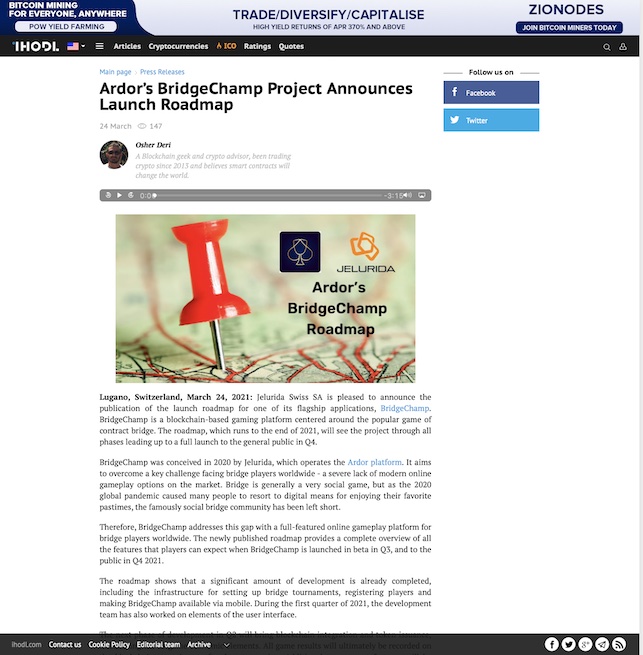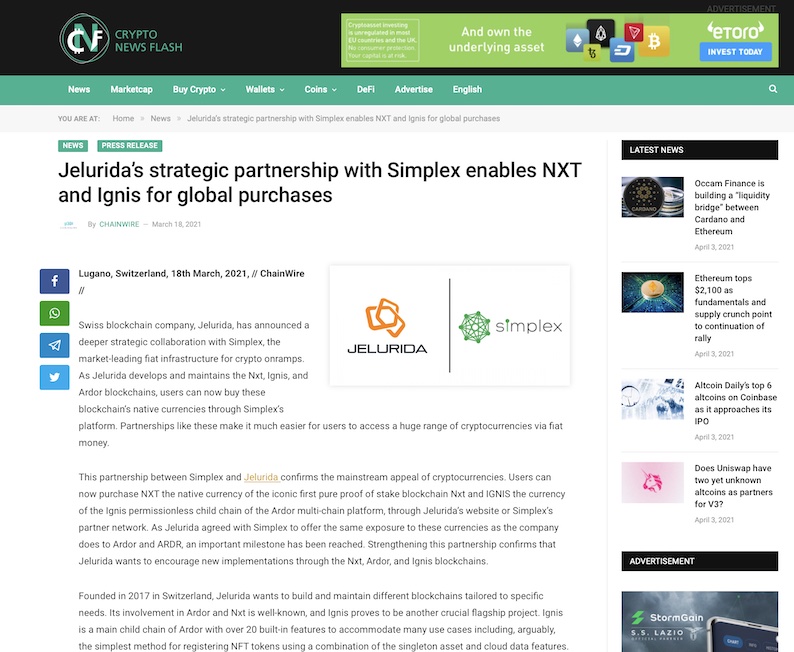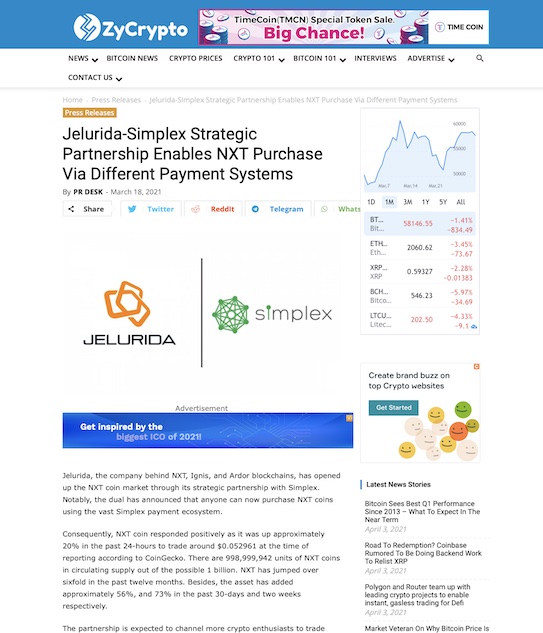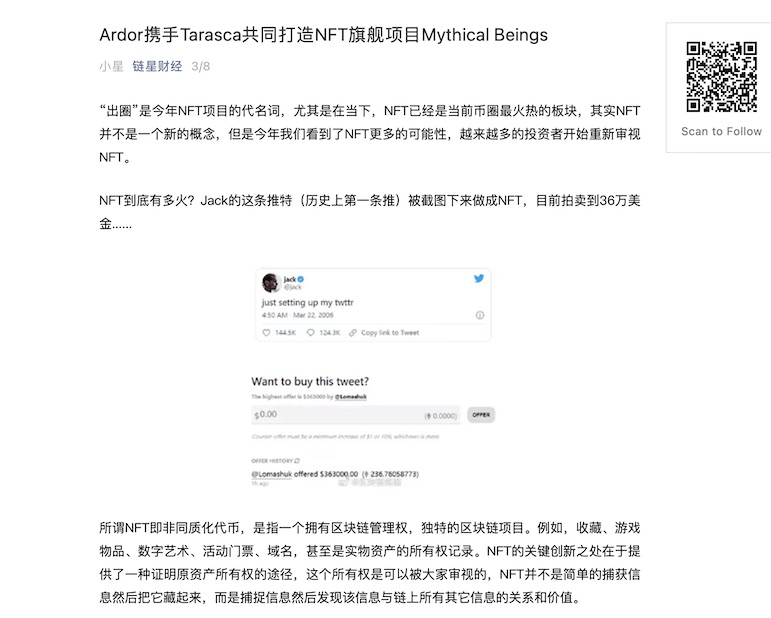Media Mentions
IEB报告:2021年区块链的价值与加密经济——泡沫投机?比特币与传统银行业的挑战与进化
WeChat: 作者简介:阿尔贝托·费尔南德斯(Alberto Fernández),IEB区块链和数字创新教授,Jelurida商业总监
背景介绍:IEB是西班牙的独立证券研究机构,隶属于马德里康普腾斯大学(Complutense University),由马德里证券交易所赞助。
我们正处在一个独特的历史时刻,正经历着货币形态和交易方式的改变。近年来,区块链技术和随之而来的去中心化金融受到监管机构的高压。不仅如此,公众舆论和私人公司自区块链技术发展开始,一直在唱空和质疑。
但2020年和疯狂的2021年已经扭转了这种现象。越来越多的机构正在考虑投资加密货币,私人基金已经开始买入加密货币作为长期投资,各大国际公司也在不断加入。这是怎么回事?
March 26, 2021


Ardor’s BridgeChamp Project Announces Launch Roadmap
IHodl: Jelurida Swiss SA is pleased to announce the publication of the launch roadmap for one of its flagship applications, BridgeChamp. BridgeChamp is a blockchain-based gaming platform centered around the popular game of contract bridge. The roadmap, which runs to the end of 2021, will see the project through all phases leading up to a full launch to the general public in Q4.
The newly published roadmap provides a complete overview of all the features that players can expect when BridgeChamp is launched in beta in Q3, and to the public in Q4 2021. The roadmap shows that a significant amount of development is already completed, including the infrastructure for setting up bridge tournaments, registering players and making BridgeChamp available via mobile. During the first quarter of 2021, the development team has also worked on elements of the user interface.
Also covered by: CoinGape, Cryptopotato, ZyCrypto, CoinCheckup, OBN, ChainBits, CryptoMode and Chainwire
March 24, 2021
Jelurida’s strategic partnership with Simplex enables NXT and Ignis for global purchases
Crypto News Flash: Swiss blockchain company, Jelurida, has announced a deeper strategic collaboration with Simplex, the market-leading fiat infrastructure for crypto onramps. Users can now buy these blockchain’s native currencies through Simplex’s platform. Partnerships like these make it much easier for users to access a huge range of cryptocurrencies via fiat money.
This partnership between Simplex and Jelurida confirms the mainstream appeal of cryptocurrencies. Users can now purchase NXT the native currency of the iconic first pure proof of stake blockchain Nxt and IGNIS the currency of the Ignis permissionless child chain of the Ardor multi-chain platform, through Jelurida’s website or Simplex’s partner network. As Jelurida agreed with Simplex to offer the same exposure to these currencies as the company does to Ardor and ARDR, an important milestone has been reached. Strengthening this partnership confirms that Jelurida wants to encourage new implementations through the Nxt, Ardor, and Ignis blockchains.
Also covered by CoinCheckup, OBN, Blockspot.io, CryptoMode, Sahiwal.tv and Chainwire
March 18, 2021


Jelurida-Simplex Strategic Partnership Enables NXT Purchase Via Different Payment Systems
ZyCrypto: Jelurida, the company behind NXT, Ignis, and Ardor blockchains, has opened up the NXT coin market through its strategic partnership with Simplex. Notably, the dual has announced that anyone can now purchase NXT coins using the vast Simplex payment ecosystem.
The partnership is expected to channel more crypto enthusiasts to trade NXT coins. The huge demand combined with limited supply is set to work in favor of the NXT market price in the near future. “We’re excited to work with Jelurida to support the growing demand of seamless, worldwide access to cryptocurrencies, and to continue enabling our secure onramp solution for anyone, anywhere”, said Ari Last, VP of Business Development at Simplex.
Notably, anyone registered on the Simplex system can purchase NXT coins through methods like PayPal, Visa, MasterCard, SWIFT, Apple Pay, SEPA, and many more.
March 18, 2021
Ihodl:Ardor和Simplex的合作会促进更有效的区块链应用
WeChat: 今天,科技媒体正在谈论通过OTC服务商 Simplex上线Ardor 链相关工具,以及附加的 Ignis 和 Nxt 子链协议。
这次强强联手的看点在哪?从本质上讲,Ardor 的结构和子母链设置驱动了更多类型的数字资产。通过该模型,用户将能够受益于 Ignis 和 Nxt 链提供的关键功能,在一个聚焦DEFI不断创新的开源生态系统中。
这些都依赖于Jelurida公司之前的工作,该公司于2016年在荷兰开始,现在在世界各地运营。Jelurida同时维护、开发Ardor 和 Nxt,并有助于为金融科技市场提供稳定性。
March 15, 2021


Ardor携手Tarasca共同打造NFT旗舰项目Mythical Beings
WeChat: 所谓NFT即非同质化代币,是指一个拥有区块链管理权,独特的区块链项目。例如,收藏、游戏物品、数字艺术、活动门票、域名,甚至是实物资产的所有权记录。NFT的关键创新之处在于提供了一种证明原资产所有权的途径,这个所有权是可以被大家审视的,NFT并不是简单的捕获信息然后把它藏起来,而是捕捉信息然后发现该信息与链上所有其它信息的关系和价值。
所以说NFT很好的捕获了用户的价值需求,实现了资产的链上高速转移,这对底层公链来说是一个很好的机会,但也对公链提出了更高的要求。Ardor作为老牌公链,一直致力于推动NFT项目的发展,近期,Ardor链上NFT板块将会迎来一位重量级合作伙伴——Tarasca
March 08, 2021